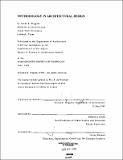Methodology in architectural design
Author(s)
Wiggins, Glenn E
DownloadFull printable version (6.564Mb)
Advisor
Donald A. Schön.
Terms of use
Metadata
Show full item recordAbstract
The act of designing in architecture is a complex process. Many designers, when probed for reasons to explain their actions, are either unable to answer questions, or provide explanations that are not true descriptions of their actions. Frequently the designer will answer that his or her reason for making a particular design decision is based on 'feeling' or 'intuition.' Under this model the design process assumes a 'mystical' aura. Architectural designers can create, yet are unable to say how they do so. Often that which can be explicitly discussed by the designer is the least significant part of his or her design process. It is unlikely that designers are 'channeling' information from cosmic sources. Rather, they are working with knowledge that is largely tacit. This thesis attempts to de-mystify the process of architectural design. Through a close scrutiny of existing literature, incorporation of personal experience as an architect, and testing of theories with lay, novice, and expert designers a theory of design methodology is proposed.
Description
Thesis (M.S.)--Massachusetts Institute of Technology, Dept. of Architecture, 1989. Includes bibliographical references (leaves 173-174).
Date issued
1989Department
Massachusetts Institute of Technology. Department of ArchitecturePublisher
Massachusetts Institute of Technology
Keywords
Architecture